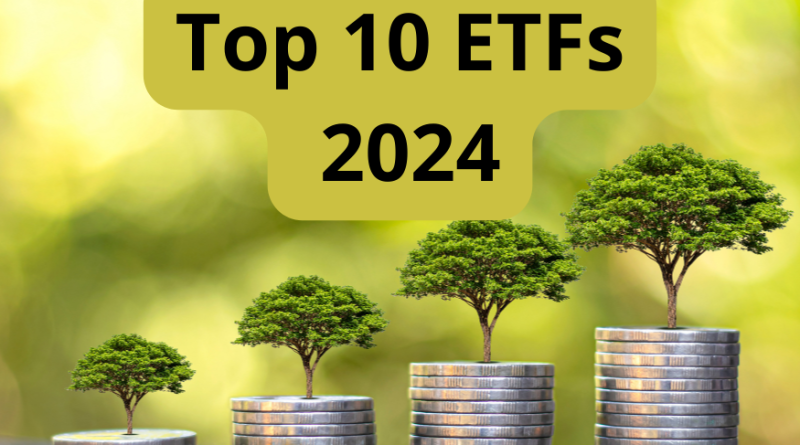Top 10 ETFs to include in your investment portfolio in 2024
Exchange-Traded Funds (ETFs) are a popular choice for investors seeking diversification, liquidity, and lower costs. With numerous options available, selecting the right ETFs can significantly enhance your investment portfolio’s performance. In this guide, we’ll explore the top 10 ETFs to consider for your portfolio in 2024, covering various sectors and investment strategies to help you achieve optimal returns.
1. Vanguard total stock market ETF (VTI)
Overview
- Sector: Broad Market
- Expense Ratio: 0.03%
- Yield: 1.2%
Why include Vanguard total stock market ETF ?
VTI provides exposure to the entire U.S. stock market, including large-, mid-, and small-cap stocks. It’s an excellent foundational ETF for broad diversification and long-term growth potential.
2. SPDR S&P 500 ETF Trust (SPY)
Overview
- Sector: Large-Cap
- Expense Ratio: 0.09%
- Yield: 1.3%
Why include SPDR S&P 500 ETF Trust (SPY) ?
SPY tracks the S&P 500 Index, offering exposure to 500 of the largest U.S. companies. It’s a core holding for any portfolio, providing stability and reliable growth.
3. Invesco QQQ Trust (QQQ)
Overview
- Sector: Technology
- Expense Ratio: 0.20%
- Yield: 0.5%
Why include Invesco QQQ Trust (QQQ) ?
QQQ tracks the Nasdaq-100 Index, featuring the largest non-financial companies in the Nasdaq. It’s ideal for investors looking to capitalize on the technology sector’s growth.
4. iShares MSCI Emerging Markets ETF (EEM)
Overview
- Sector: Emerging Markets
- Expense Ratio: 0.68%
- Yield: 1.8%
Why include iShares MSCI Emerging Markets ETF (EEM) ?
EEM provides exposure to emerging markets, offering growth opportunities outside developed economies. It’s perfect for diversifying geographically.
5. Vanguard FTSE Developed Markets ETF (VEA)
Overview
- Sector: International Developed Markets
- Expense Ratio: 0.05%
- Yield: 2.8%
Why include Vanguard FTSE Developed Markets ETF (VEA) ?
VEA offers exposure to developed markets outside North America, enhancing global diversification. It’s a low-cost option for accessing international stocks.
6. iShares Russell 2000 ETF (IWM)
Overview
- Sector: Small-Cap
- Expense Ratio: 0.19%
- Yield: 1.1%
Why include iShares Russell 2000 ETF (IWM) ?
IWM tracks the Russell 2000 Index, focusing on small-cap U.S. companies. It’s suitable for investors seeking high growth potential through smaller firms.
7. Vanguard Real Estate ETF (VNQ)
Overview
- Sector: Real Estate
- Expense Ratio: 0.12%
- Yield: 3.7%
Why include Vanguard Real Estate ETF (VNQ) ?
VNQ provides exposure to the U.S. real estate sector, including REITs. It’s an excellent choice for income-seeking investors and portfolio diversification.
8. SPDR Gold Shares (GLD)
Overview
- Sector: Commodities
- Expense Ratio: 0.40%
- Yield: N/A
Why include SPDR Gold Shares (GLD) ?
GLD tracks the price of gold, offering a hedge against inflation and economic instability. It’s a valuable asset for protecting your portfolio during market downturns.
9. iShares iBoxx $ Investment Grade Corporate Bond ETF (LQD)
Overview
- Sector: Bonds
- Expense Ratio: 0.14%
- Yield: 3.5%
Why include iShares iBoxx $ Investment Grade Corporate Bond ETF (LQD) ?
LQD provides exposure to investment-grade U.S. corporate bonds, offering steady income and reduced risk compared to equities. It’s essential for balancing your portfolio.
10. ARK Innovation ETF (ARKK)
Overview
- Sector: Innovation
- Expense Ratio: 0.75%
- Yield: N/A
Why include ARK Innovation ETF (ARKK)?
ARKK focuses on companies involved in disruptive innovation across various sectors. It’s ideal for investors looking to capture high-growth opportunities in cutting-edge industries.
Conclusion
Including these top 10 ETFs in your investment portfolio can help you achieve a well-rounded, diversified investment strategy in 2024. By spreading your investments across different sectors, you can optimize returns while managing risk effectively. Remember to periodically review and adjust your portfolio to ensure it remains aligned with your financial goals and market conditions.
For personalized advice, consider consulting with a financial advisor to tailor these recommendations to your specific needs and objectives. Happy investing!

